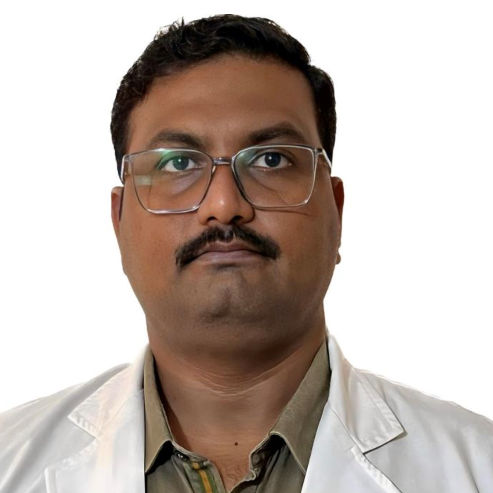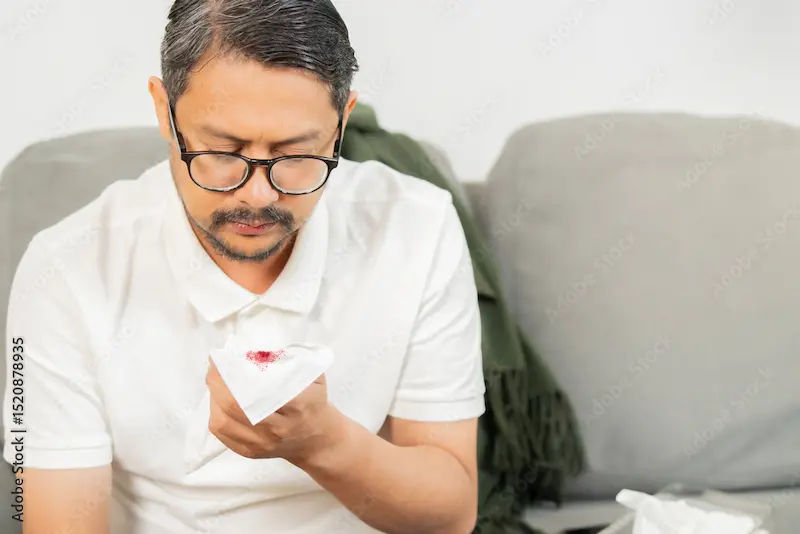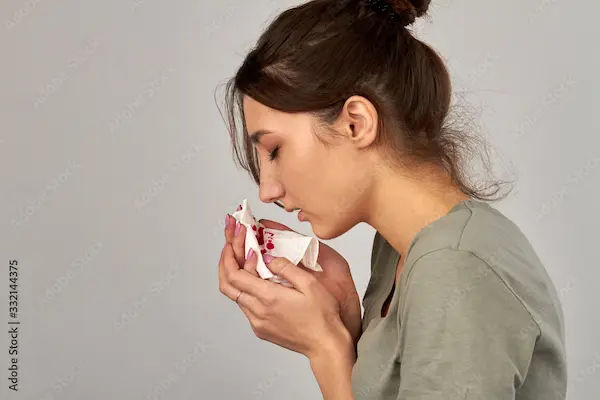Coughing Up Blood Causes and Care Advice
Learn about the possible causes of coughing up blood (hemoptysis), from minor issues to serious conditions. Discover when to seek medical help and how it's diagnosed and treated.

Written by Dr. D Bhanu Prakash
Reviewed by Dr. J T Hema Pratima MBBS, Fellowship in Diabetes Mellitus
Last updated on 13th Jan, 2026

Coughing up blood, medically known as hemoptysis, can be a frightening experience. While it may not always indicate a serious condition, it should never be ignored. This article will help you understand the possible causes, when to seek medical help, and how to manage this symptom effectively.
What Does Coughing Up Blood Mean?
Coughing up blood means that you are expelling blood from your lungs or respiratory tract. The blood may appear:
- Bright red or rust-colored
- Mixed with mucus or phlegm
- In small streaks or larger amounts
It’s important to distinguish between blood coming from your respiratory system and blood from your nose, mouth, or stomach (which may appear darker and mixed with food particles).
Consult a Top Pulmonologist
Common Causes of Coughing Up Blood
Several conditions can lead to hemoptysis, ranging from mild to severe. Some common causes include:
1. Infections
- Bronchitis or Pneumonia: Infections in the lungs can irritate the airways, leading to small amounts of blood in mucus.
- Tuberculosis (TB): A serious bacterial infection that can cause persistent coughing with blood.
2. Chronic Lung Conditions
- Chronic Obstructive Pulmonary Disease (COPD): Long-term lung damage can lead to coughing with blood.
- Bronchiectasis: A condition where airways become damaged and produce bloody mucus.
3. Lung Cancer or Tumors
- Blood-streaked phlegm can sometimes be an early sign of lung cancer, especially in smokers.
4. Pulmonary Embolism (Blood Clot in the Lungs)
- A sudden blockage in a lung artery can cause coughing up blood, along with chest pain and shortness of breath.
5. Other Causes
- Nosebleeds or throat irritation (blood may drip into the lungs and be coughed up).
- Inhaled foreign objects (especially in children).
- Certain medications (like blood thinners).
When Should You See a Doctor?
Seek immediate medical attention if you:
- Cough up more than a few teaspoons of blood
- Experience chest pain, dizziness, or difficulty breathing
- Have a history of smoking or lung disease
- Notice blood in phlegm for more than a week
Even small amounts of blood should be checked by a doctor to rule out serious conditions.
Diagnosis: What Tests Might Be Needed?
Your doctor may recommend:
- Chest X-ray or CT scan – To check for infections, tumors, or clots.
- Bronchoscopy – A thin tube with a camera to examine airways.
- Sputum test – To detect infections like tuberculosis.
- Blood tests – To check for clotting disorders or infections.
If needed, you can book a diagnostic test or consult a pulmonologist through Apollo 24|7 for quick and reliable care.
Get Your Health Assessed
How to Manage and Prevent Coughing Up Blood
While treatment depends on the underlying cause, here are some general care tips:
1. Stay Hydrated
- Drinking warm fluids like herbal tea or water helps thin mucus and soothe irritation.
2. Avoid Irritants
- Quit smoking and avoid secondhand smoke.
- Stay away from pollutants, dust, and strong fumes.
3. Use a Humidifier
- Moist air can ease coughing and prevent throat dryness.
4. Follow Medical Advice
- If an infection is the cause, complete the prescribed antibiotics.
- For chronic conditions like COPD, follow your treatment plan carefully.
5. Monitor Symptoms
- Keep track of how often you cough up blood and any accompanying symptoms.
Final Thoughts
Coughing up blood can be alarming, but early diagnosis and treatment can make a big difference. If you or a loved one experiences this symptom, don’t delay, consult a doctor to determine the cause and get the right care.
Consult a Top Pulmonologist
Consult a Top Pulmonologist

Santoshkumar P Hammigi
Pulmonology Respiratory Medicine Specialist
4 Years • MBBS,MD, (Respiratory Medicine)
Bengaluru
Apollo Medical Center, Marathahalli, Bengaluru
(25+ Patients)

Dr. P Sravani
Pulmonology Respiratory Medicine Specialist
3 Years • MBBS, MD
Visakhapatnam
Apollo Clinic Vizag, Visakhapatnam
Dr. Ambuj Kumar
Pulmonology Respiratory Medicine Specialist
10 Years • MBBS, MD (Pulmonary Medicine)
New Delhi
Smriti Gynaecology and Lung Centre, New Delhi

Dr Rakesh Bilagi
Pulmonology Respiratory Medicine Specialist
10 Years • MBBS MD PULMONOLOGIST
Bengaluru
Apollo Clinic, JP nagar, Bengaluru

Dr. K Prasanna Kumar Reddy
Pulmonology Respiratory Medicine Specialist
16 Years • MBBS, DTCD (TB&CHEST), DNB (PULM MED), FCCP
Hyderabad
Apollo Medical Centre Kondapur, Hyderabad
Consult a Top Pulmonologist

Santoshkumar P Hammigi
Pulmonology Respiratory Medicine Specialist
4 Years • MBBS,MD, (Respiratory Medicine)
Bengaluru
Apollo Medical Center, Marathahalli, Bengaluru
(25+ Patients)

Dr. P Sravani
Pulmonology Respiratory Medicine Specialist
3 Years • MBBS, MD
Visakhapatnam
Apollo Clinic Vizag, Visakhapatnam
Dr. Ambuj Kumar
Pulmonology Respiratory Medicine Specialist
10 Years • MBBS, MD (Pulmonary Medicine)
New Delhi
Smriti Gynaecology and Lung Centre, New Delhi

Dr Rakesh Bilagi
Pulmonology Respiratory Medicine Specialist
10 Years • MBBS MD PULMONOLOGIST
Bengaluru
Apollo Clinic, JP nagar, Bengaluru

Dr. K Prasanna Kumar Reddy
Pulmonology Respiratory Medicine Specialist
16 Years • MBBS, DTCD (TB&CHEST), DNB (PULM MED), FCCP
Hyderabad
Apollo Medical Centre Kondapur, Hyderabad




